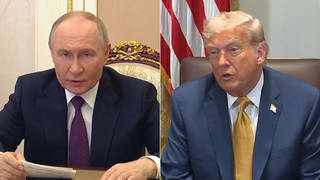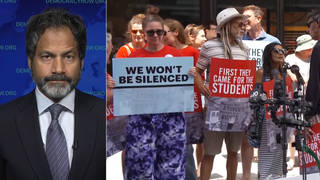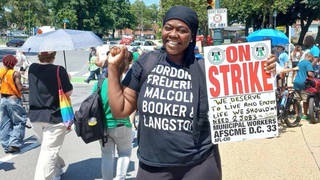
Topics
Guests
- Joseph Stiglitzwinner of the 2001 Nobel Prize in Economics. He is a professor at Columbia University and the former chief economist at the World Bank. He is the co-author of The Three Trillion Dollar War: The True Cost of the Iraq Conflict.
The Senate has endorsed a revised version of the $700 billion Wall Street bailout plan. The legislation was easily approved last night on a 74-to-25 vote with a majority of Democrats and Republicans voting in favor — among them, presidential nominees Barack Obama and John McCain. Nobel Prize-winning economist Joseph Stiglitz says the measure, although flawed, should be supported now and revisited after the November elections. [includes rush transcript]
Transcript
JUAN GONZALEZ: The Senate has endorsed a revised version of the $700 billion Wall Street bailout plan. The legislation was easily approved last night on a 74-to-25 vote with the majority of Democrats and Republicans voting in favor — among them, presidential nominees Barack Obama and John McCain. But the measure faces a tougher test tomorrow in the House, where congressional leaders will try to reverse the stunning defeat the legislation suffered earlier in the week.
The centerpiece of the bill authorizes the government to buy billions of dollars of troubled assets from financial institutions rocked by record home foreclosures. The original proposal has been heavily revised to attract wider support from lawmakers. The bill passed last night includes $150 billion in tax breaks for individuals and businesses. It also temporarily raises the limit on federal bank-deposit insurance from $100,000 to $250,000.
The changes in the bill were measurable by volume. The initial proposal from the Treasury Department ran just three pages; the latest version exceeds 450 pages.
AMY GOODMAN: Some of the changes appear aimed at enticing specific lawmakers to change their votes from no to yes. For example, the bill now includes a provision to boost insurance coverage of mental illness, a priority of Minnesota Republican Jim Ramstad, who voted against the bill on Monday. It also includes a tax benefit for bicycle commuting sought by Oregon Democrat Earl Blumenauer, also a “no” vote on Monday.
Congressional leaders are hoping to win over at least the dozen or so votes needed to reverse Monday’s outcome and send the measure to President Bush.
Joseph Stiglitz is the winner of the 2001 Nobel Prize for Economics. He is a professor at Columbia University and the former chief economist at the World Bank. He is the co-author of The Three Trillion Dollar War: The True Cost of the Iraq Conflict. Joe Stiglitz joins us on the phone right now from Europe.
Welcome to Democracy Now!, Professor Stiglitz.
JOSEPH STIGLITZ: Nice to be here.
AMY GOODMAN: What is your response to the passage of the bailout by the Senate? Still, the House is to come.
JOSEPH STIGLITZ: Well, I think it remains a very bad bill. It is a disappointment, but not a surprise, that the administration came up with a bill that is again based on trickle-down economics. You throw enough money at Wall Street, and some of it will trickle down to the rest of the economy. It’s like a patient suffering from giving a massive blood transfusion while there’s internal bleeding; it doesn’t do anything about the basic source of the hemorrhaging, the foreclosure problem. But that having been said, it is better than doing nothing, and hopefully after the election, we can repair the very many mistakes in it.
But this particular way of getting it through, I have to say, really smells. They added — you know, the cost was already $700 billion. They added $150 billion of tax benefits. Some of these are really quite, quite amazing, the kinds of things that they put in: tax credit to American Samoan businesses — you mentioned a couple already in your talk — 50 percent tax credit for some expenditures or maintaining railroad tracks, motor sports racetrack property given a seven-year recovery period. You can go down the list. What they did was basically old-fashioned, corrupt bribery. They found out — I was joking that they talked about a reverse auction for the — for buying the distressed assets; they had a reverse auction for buying congressmen, and they put in anything they needed to do to get the congressional support for a basically flawed bill.
JUAN GONZALEZ: Well, Joseph Stiglitz, you’re talking to us from Europe. And in Europe, the banking crisis there, the governments have really chosen a different route than what we’re seeing in Congress. Haven’t they, in effect, in the last week nationalized some of the major banks, thus taking both the bad debt and the good debt of these banks together, as opposed to the route that we’re taking here, apparently, where Congress is basically assuming all the bad debt and leaving the good dead in private hands?
JOSEPH STIGLITZ: That’s right. I mean, you know, my Nobel Prize for was for work in asymmetric information, a problem of lemons. This is designed — the Paulson plan is a nontransparent bailout for Wall Street, where we take off their hands these bad assets, leaving them with the good assets. It’s complex. We’re talking about thousands, hundreds of thousands of assets that the government is not in a good position to be doing this.
The alternative model has — is a proven model. It worked in Sweden, Norway. I don’t know why we didn’t do this better model. And there are versions that are short of nationalization. I sometimes refer to this as the Buffett model. He put in money into Goldman Sachs, got back preferred shares and warrants, so he got both protection on the downside and participation on the upside. This would have been so much better for reinvigorating our banks and for protecting American taxpayers.
I mean, the fundamental problem, I think, that Paulson still has not understood, the banks made some very bad loans. They made loans on the basis of asset prices that were inflated by a housing bubble. That bubble has broken. Some of those loans won’t be repaid or will only be repaid in part. There’s a hole in the balance sheet, and that has to be repaired. And they have — this bill does not do it, unless it does it surreptitiously by overpaying for these assets.
AMY GOODMAN: Joseph Stiglitz, can you go back to the savings and loan scandal and talk about what happened there and how that relates to today?
JOSEPH STIGLITZ: Well, one of the interesting things about the S&L debacle twenty years ago is that it is a reminder of how much this is likely to cost the American taxpayer. You know, the administration has made a big deal that we may wind up making a profit. Well, we didn’t suffer as much loss as we might have done in the S&L, but it still wound up costing the American taxpayers some $200 billion or more. And remember, that was a relatively small fraction of America’s financial system.
We’re now talking about not a few S&Ls; we’re talking about the core American banking system. So, if you’re thinking about that little problem costing our taxpayers back then that amount, you can imagine what this is going to cost the American taxpayer. And that was relatively well managed; this is being very badly managed. Now, in a way, it’s a little bit — the similarity is that we wound being the largest landowner — real estate owner in the world; as we — as the banks failed, we took over the properties, and then we had to resell them, and we did get something when we resold them, but we took a real bath.
JUAN GONZALEZ: I’d like to ask you, one of the things that’s happened as a result of this enormous convulsion is that the government has basically supported the concentration of ownership of banks. We now have three banks in the United States — JPMorgan Chase, Bank of America and Citicorp — that are holding 30 percent of all of the deposits of Americans in banks in the country. Do you see any increased danger from this enormous concentration of assets of banks now?
JOSEPH STIGLITZ: Very much so. You know, we got into this problem, apparently because we did not have effective enforcement of antitrust policies, and we wound up with institutions that were too big to fail. And we know when you have institutions that are too big to fail, that they — there’s a real risk of their engaging in excessive risk-taking, because they know, you know, they get to take the profits when things turn out well, and Wall Street really did take those profits in recent years, but when the losses come up, they know that we’re going to bail them out, which we are in the process of doing. So, this is predictable. And when you have too big to fail, the problems are getting worse and worse. So, as we solve this problem, we are actually creating — exacerbating the potential for future problems.
In addition to that, the likelihood — you know, what makes the market economy work is vibrant competition. Already, the financial sector has been accused, and I think correctly, of engaging in non-competitive practices. And you see it in the credit card fees, which are far above competitive — equilibrium levels. That’s why they, you know, have been able to generate such profits from a very simple technology. And so, we know that they’re already engaging in anti-competitive practices. Now you have this additional concentration, the risk of this non-competitive behavior just increases all the more.
One other point I wanted to make about — going back to the S&L crisis, that’s important to take and bear in mind, the S&L crisis, I think, led very directly to the recession that came a couple years later, the ’90, ’91, ’92, that lasted until ’93, late ’93, beginning ’94. What we should be anticipating is that, in fact, no matter what plan we put forward, there will be a credit contraction. Already, states and localities are facing a shortfall of revenue, and they’re cutting back on expenditures; big weaknesses in balance sheets at firms; and households have been hurt by the problems that we’ve been having. So, we can expect the economic downturn that we’ve already been experiencing, the fact that no jobs have been created this year — we should expect that to get worse under the best of plans. And the problem is, this is not the best of plans.
AMY GOODMAN: Joe Stiglitz, I wanted to play for you the proposal of Bruce Marks. We had him on the show the other day. He is the CEO of the Neighborhood Assistance Corporation of America in Boston.
BRUCE MARKS: The fact of the matter is, this thing should be killed. It should not happen at all. It does nothing, Amy, for the homeowners. And what we have to say to Congress, Amy, is we have to say, “It’s the foreclosures, stupid,” just like Bill Clinton said to the first George Bush, “It’s the economy, stupid.” We have to say to this Congress, “It’s the foreclosures, stupid.”
And they have to do three things: do a moratorium on foreclosures, stop the interest-rate increases, and restructure loans to make them affordable. That’s it, without one dollar of taxpayer money.
AMY GOODMAN: Joseph Stiglitz, what about what Bruce Marks proposes?
JOSEPH STIGLITZ: Well, I mean, he’s clearly right. This is the point I made before, that we’re having a massive blood transfusion without stopping the hemorrhaging at the bottom. Real estate prices are likely to continue to fall. And we need to do more. This proposal does very little to stem the underlying problem.
I would add to the list a couple things. I would, for instance, convert our current mortgage deduction into a cashable tax credit. The reality — you know, what we do for rich Americans is, in effect, through our tax system, in many states, are paying 50 percent of the housing costs, because the interest in real estate taxes are tax-deductible. For poor Americans, we do nothing, or much less. It’s inequitable. It’s inefficient. And a conversion from this tax deduction to tax credit would allow people to better be able to afford to stay in their homes.
Secondly, we do need a reform bankruptcy law to encourage restructuring of the mortgages. There was predatory lending. And even when it wasn’t predatory lending, the fact is that today a very large fraction of homes have mortgages that are — exceed the value of the house. The banks ought to recognize the loss, just write down the value of the mortgage to, say, 90 or 80 percent of the value of the property.
And finally, I think it may be desirable to have a government mortgage program taking advantage of our lower — government’s lower cost of capital, a better ability to collect, passing on some of those lower interest to homeowners. I don’t think it does any good to have these people evicted from their homes. So, that would allow people to have lower mortgage costs, allow them to stay in their homes, convert them — perhaps the non-recourse loans to a recourse loan, but only do it if there is this reduction in the value of the mortgage, so that the lenders take a haircut on those mortgages.
JUAN GONZALEZ: Yeah, I’d like to ask you, the impact, in two ways, of this enormous additional debt that the government is taking on: one, in terms of how this will affect the ability of the new president to implement whatever programs he is hoping to implement, and two, how it’s affecting the standing of — the financial standing of the United States in the world, in terms of its relative influence vis-a-vis other countries and governments, in essence, and banks in other countries that are now helping the United States get through this crisis?
JOSEPH STIGLITZ: Well, first, let me make an observation, that it wasn’t very long ago that the President vetoed a bill to provide healthcare, health insurance, to poor American children who otherwise would not get healthcare. Without that healthcare, they could be scarred for life. And he said — and this is a bill that costs a few billion a year — he said we could not afford it. We didn’t have the money. All the sudden, we found this $700 billion to help Wall Street. And that sort of shows you a sense of priorities, a sense of proportion.
The fact is that Americans are not saving. Household saving has been close to zero; some quarters, it’s been negative. One of the problems with the Bush administration is that it thinks that tax cuts are a solution to every problem, and the February stimulus package focused on encouraging even more consumption through the tax cut. So, what does that mean? That means to finance this money, we’re going to have to borrow money. But where are we going to borrow it from? America is not saving. So, most of this money, or at least a significant fraction, is going to come from abroad. And that means we are going to be more indebted to China and to other countries. Our living standards in the future are going to be lower. We’re going to be sending checks on interest, and banks will repay it, on principle, abroad, money that could have gone into improving our standard of living, a whole set — you know, education, technology, infrastructure, to make our economy more competitive.
The basic lesson of economics is there’s no such thing as a free lunch, and there’s no such thing as a free war, and there’s no such thing as a free bailout. Our resources are scarce, and we’re going to have to give up something. And the amount that we have to give up will depend, in the long run, on how well we protect taxpayers in this bailout. And that’s one of the main criticisms of the Paulson plan. It’s not as well designed as it should be to protect American taxpayers.
AMY GOODMAN: Finally, Joseph Stiglitz, you’re co-author of The Three Trillion Dollar War: The True Cost of the Iraq Conflict. How does the bailout connect to war?
JOSEPH STIGLITZ: Very much. Let me first explain a little bit how the current crisis connects with the war. One of the reasons that we have this crisis is that the Fed flooded the economy with liquidity and had lax regulations. Part of that was this ideology of regulations were bad, but part of the reason was that the economy was weak. And one of the reasons the economy was weak was oil prices were soaring, and part of the reason oil prices were soaring is the Iraq war. When we went to war in 2003, before we went, prices were $23 a barrel. Futures markets thought they would remain at that level. They anticipated the increase in demand, but they thought there would be a concomitant increase in supply from the low-cost providers, mainly in the Middle East. The war changed that equation, and we know what happened to the oil prices.
Well, why is that important? Well, we were spending — Americans were spending hundreds of millions — billions of dollars to buy — more, to buy imported oil. Normally, that would have had a very negative effect on our economy; we would have had a slowdown. Some people have said, you know, it’s a mystery why we aren’t having that slowdown; we repealed the laws of economics. Whenever anybody says that, you ought to be suspect.
It was actually very simple. The Fed engineered a bubble, a housing bubble to replace the tech bubble that it had engineered in the ’90s. The housing bubble facilitated people taking money out of their mortgages; in one year — out of their houses; in one year, there were more than $900 billion of mortgage equity withdrawals. And so, we had a consumption boom that was so strong that even though we were spending so much money abroad, we could keep the economy going. But it was so shortsighted. And it was so clear that we were living on borrowed money and borrowed time. And it was just a matter of time before, you know, the whole thing would start to unravel.
AMY GOODMAN: Joseph Stiglitz, I want to thank you for being with us, speaking to us from Austria, winner of the 2001 Nobel Prize for Economics, professor at Columbia University, former chief economist at the World Bank, co-author with Linda Bilmes of The Three Trillion Dollar War: The True Cost of the Iraq Conflict.













Media Options